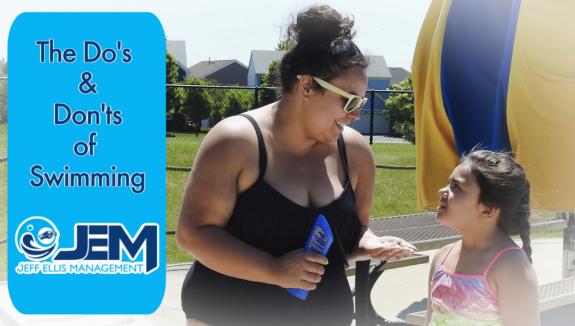- Home
- Blog
- Do's and Don'ts of Swimming
-
Don't leave children unattended/unsupervised around any water source. This includes swimming pools, open water (ocean, lake, etc.) anything that can hold water up to an inch or more. If the mouth and nose can be covered, then supervise your child around that water source. If in a large gathering, designate an adult to oversee the swimming area when children are present. The best way to ensure that no one gets hurt is to keep a close eye on your children at all times, no matter how old they are.

-
Walk, don't run on the pool deck. Trips and falls happen all of the time and can result in a cut, scrap or a broken bone if you're not careful. Pool decks can become slippery when water is present, and falling into the pool can present another challenge for staff and parents around. Carefully walk around the pool deck to avoid any trips or falls.

-
Don't leave pool unsecure or unlocked when not in use. An unlocked gate or pool left open for anyone to get in is asking for trouble. Always doublecheck locks and gates before closing down a pool whether that's a facility, home pool or blow up pool in your backyard. Taking that extra step of securing your pool will keep accidents or a death from happening.

-
Don't forget to stay hydrated. Keep a water bottle filled and close by when doing any sort of physical activity like swimming. Staying hydrated will help in reducing heat related emergencies such as heat cramps, heat exhaustion, and heat stroke. This will help keep the body regulated with temperature and keep the body cooled down during those hot summer days.

-
Don't let the pool get dirty or have unbalanced chemicals. This can result in sickness if not kept up on regularly. A dirty pool is unsightly and isn't inviting to guests or family members and can also become a hazard as to what is in the pool when children are trying to swim. Checking the chemicals for chlorine and PH on a daily basis will keep your guests safe from sickness and your water crystal clear.

-
Don't dive headfirst into a water source. Head and neck injuries can happen at a moment's notice and an emergency can ensue. Check the pool deck to see if diving is allowed or ask a staff member before attempting to dive. Even if your child is small always have them enter the water feet first.

-
Don't forget the sunscreen and to reapply every two hours, or when exiting the water for a long period of time. If you have time at home, apply sunscreen before putting on swim wear; this will allow you to take your time and cover all of the exposed skin. Plus, when you get to the swimming pool, the kids don't have to wait impatiently to get in—they can just enjoy the fun right away!

-
Don't swim alone. When children are still learning, they should always be within arm's reach of an adult - even if they think they can swim on their own with floatation devices on. Floaties give parents a false sense of security when it comes to the pool, and they should still be within arm's reach of their child at all times. Along with children, adults shouldn't swim alone either. Accidents happen and swimming alone is never a good idea. Have a buddy system in place while swimming so you can keep an eye on each other. Also, who wouldn't want to enjoy the pool with a friend or family member?!

-
Don't horseplay in the pool. Chicken fights, wrestling moves or any sort of horseplay that could cause a drowning or restrict the air to the lungs can be dangerous. Everyone wants to have fun but let's stay safe at the same time.

-
If you see something in the pool say something immediately. Parents observing and watching over the water might not know the difference between a towel at the bottom of the pool or a child at the bottom. Drowning is usually silent and isn't what you would typically see in movies of someone screaming for help. Always stay vigilant, know who is swimming and who is out of the pool and if you see anything at the bottom of the pool always let an adult know so they can inspect and get it out quickly.












